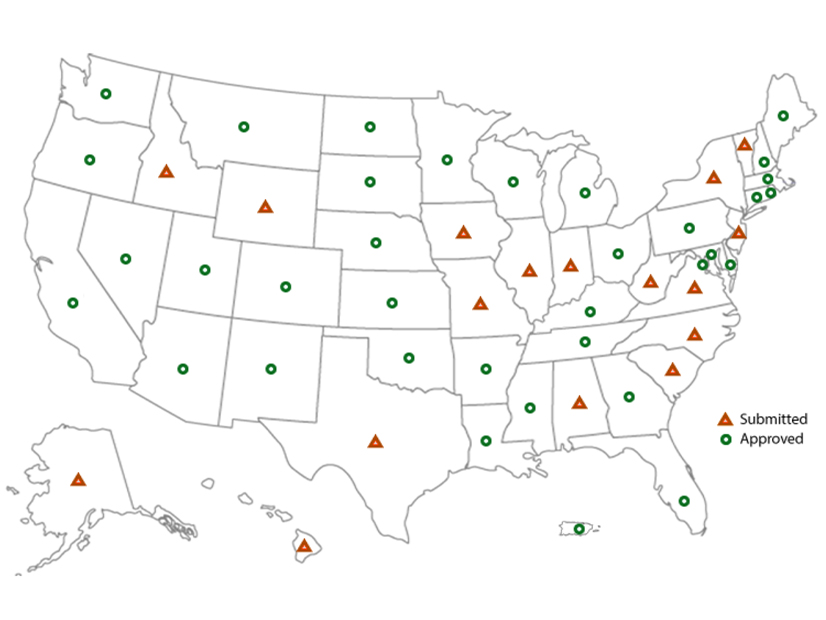
One day after President Biden celebrated the passage of the Inflation Reduction Act ― including its incentives to help more Americans buy electric vehicles ― the administration on Wednesday also announced that 35 states have been approved to receive millions in federal funding to be used to build out a national network of EV chargers.
A key provision in the Infrastructure Investment and Jobs Act, the National Electric Vehicle Initiative (NEVI) program will be distributing $5 billion in funds for those chargers over the next five years. Biden’s goal is to have 500,000 chargers installed across 53,000 miles of U.S. highways. Funds are allocated to each state based on a formula.
Under rules issued in February, states had an Aug. 1 deadline for submitting initial plans to the Federal Highway Administration (FHWA) for how they will use the NEVI formula funds. The FHWA set itself a Sept. 30 deadline for approving the plans, received on time from all 50 states, D.C. and Puerto Rico. (See States to Get $615 Million for EV Charging from IIJA Funds.)
For the approved plans, FHWA will be releasing formula funds for both 2022 and 2023 — a total of more than $900 million for the 35 states — according to an agency spokesperson.
The formula used for the allocations is based on the formula used for federal highway programs. Those allocations ensure each state receives 95 cents on the dollar for the taxes on gasoline and diesel their residents pay into the federal Highway Trust Fund.
Transportation Secretary Pete Buttigieg called the early approvals “an important step to build a nationwide electric vehicle charging network where finding a charge is as easy as locating a gas station.”
“Making electric vehicle charging accessible to all Americans is critical to achieving a transportation sector that improves our environment and lessens our dependence on oil and gas,” Energy Secretary Jennifer Granholm said. The states with approved plans “now have the green light to build their pieces of the national charging network to ensure drivers can spend less on transportation costs while commuting confidently by charging along the way.”
For this initial round of funding, states were required to identify key “alternative fueling corridors” (AFCs) — major state and interstate highways — where EV charging stations could be located every 50 miles, within 1 mile of the designated AFCs.
For example, Maryland’s plan, which won early approval, identified 502 “optimal” locations where it might install charging stations over the next five years, using its NEVI funding, although not all the sites are within 1 mile of the state’s AFCs.
FHWA also released additional technical guidelines in June for the charging stations to be installed with NEVI funds. Each station must include four 150-kW DC fast-charging ports, so multiple vehicles can charge at the same time. The stations must also be operating 97% of the time and must be able to accept all debit and credit cards without requiring any special memberships. (See Biden Administration to Order EV Charging Standards.)
Acting FHWA Administrator Stephanie Pollack said the early approvals reflected “the commitment of state leaders who worked hard to develop EV charging networks that work for their residents.”
The remaining plans are being reviewed and will be approved by Sept. 30, if not before, Pollack said. Under the IIJA, additional rounds of NEVI funding will require states to regularly update their plans and submit them to FHWA.
Challenges Ahead
Plan approvals also mean that states will be able to reimburse themselves for the expenses incurred for developing their plans, according to a statement from the Department of Energy. The NEVI funds can be used for a range of projects “directly related to the charging of a vehicle,” such as the upgrade of existing charging stations, the construction of new stations, and stations’ operations and maintenance, the department said.
Other covered activities include community engagement and workforce development, EV charging station signage, and data analysis and sharing.
However, many state plans raised concerns about challenges that NEVI funds may not be able to immediately solve. (See States File Plans on Deadline for Federal EV Charging Funds.)
Several states were uncertain whether their electric systems would be able to interconnect and integrate multiple charging stations, each with the four 150-kW DC fast charging ports called for in the NEVI guidelines.
“Upgrades needed to both the line and load side to meet this increased demand could be extremely costly, especially in areas where the infrastructure may be limited,” Maryland said in its plan. The state is assuming that installation costs to be covered with federal funds could include system upgrades as needed.
Maine’s proposed solution to the problem, laid out in its now approved plan, is a staged approach. The initial stage would see the state install charging stations with four 150-kW ports at high-traffic sites, mostly in the southern part of the state. Medium- and lower-traffic sites in the middle and northern regions will only get two 150-kW chargers, at least to start.



